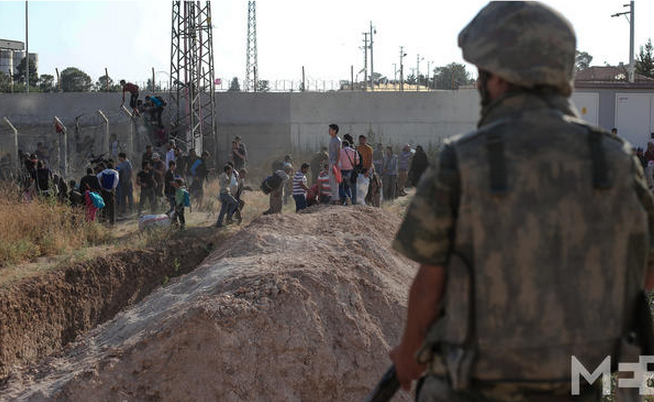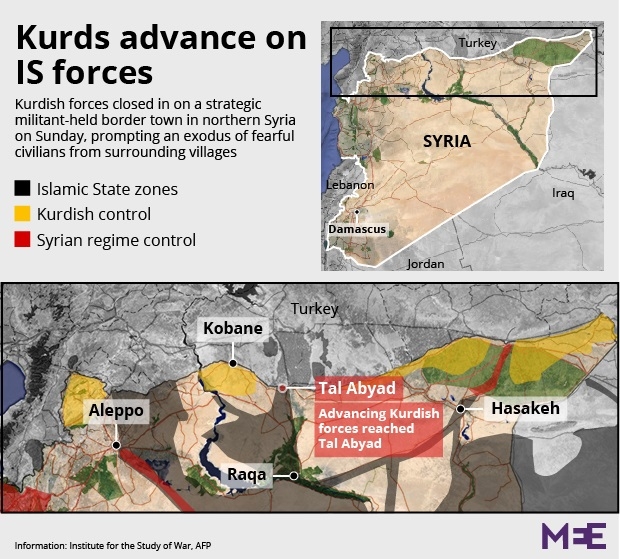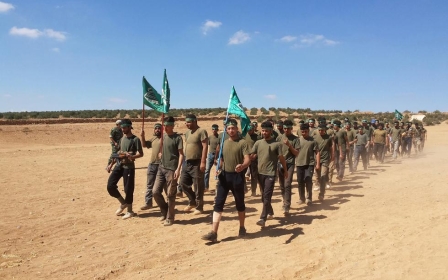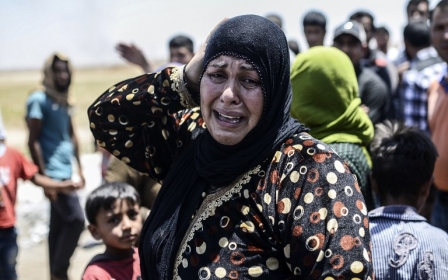YPG fighters seize border post in battle for Syrian town

Kurdish forces on Monday seized a post on Syria's border with Turkey, a vital supply line to the Islamic State group, as they battle for the IS-held town of Tal Abyad.
The Kurdish People's Protection Units (YPG) took up positions on the Syrian side of the border post, an AFP photographer said, after they advanced on Tal Abyad from east and west and cut the road south to Raqqa, the IS de facto capital.
"Tal Abyad is completely surrounded," Khojer told AFP, speaking by phone from near the town.
"There is nowhere Daesh can escape to," he said, using the Arabic acronym for IS.
Khojer said Kurdish fighters, backed by Syrian rebel groups, had advanced on the strategic town in a two-front offensive from east and west.
"The YPG units from Kobane (in the west) and Jazira (in the east) met up south of Tal Abyad," Khojer added.
Sherfan Darwish, a spokesman for the Burkan al-Furat rebel group fighting alongside the YPG, said the anti-IS alliance had advanced to the "outer neighbourhoods" of the town's east and south.
"There are intense clashes there with Daesh," Darwish told AFP, saying at least 19 IS militants were killed Monday.
He confirmed that Kurdish forces and their rebel allies had cut the road south of Tal Abyad, adding that most of the border town's civilian residents had already fled the intensifying violence.
Khojer said Kurdish forces were being backed by US-led coalition air raids.
Over the weekend, fighting around Tal Abyad sparked an exodus of fearful civilians from surrounding villages.
Late Saturday, the YPG advanced to within five km of Tal Abyad, the Syrian Observatory for Human Rights said.
The city lies some 85 kilometres (50 miles) north of Raqqa, and analysts say it serves as a primary conduit for incoming weapons and fighters, as well as for outgoing black market oil.
"It has been an IS stronghold for a while now, and it has been described as the gateway to Raqqa," said Charlie Winter, a researcher on extremism at the London-based Quilliam Foundation.
"Certainly, it's of strategic importance because it's a border town through which equipment, recruits, etc can pass."
Tal Abyad also sits just 70 kilometres (40 miles) east of the Kurdish-majority town of Kobane, where Kurdish forces battled for months before expelling invading IS forces in January.
Tal Abyad serves as the "main lifeblood channel for IS," connecting Raqqa to the outside world, said Mutlu Civiroglu, a Kurdish affairs analyst.
"Tal Abyad is a financial and logistical hub for IS. Once you cut this hub it is going to be very hard for IS to smuggle in fighters, to sell oil and deal in the other goods they deal in."
Kurdish forces have been chipping away at IS territory in the Raqqa province - once completely under IS's control - for around three months.
According to the Syrian Observatory for Human Rights monitoring group, they have seized some 50 towns and villages in the province.
Winter said he expected IS to fight hard to keep the strategic town and to mine it heavily.
"I don't think they'll give up without a fight."
Middle East Eye captured chaotic scenes at the Turkish border on Monday, as police and army personnel attempted to prevent thousands of Syrian refugees streaming through a hole in the barbed-wire fence into Turkish territory.
Armoured vehicles and police cars were deployed before large numbers of Syrians were eventually allowed to cross into Turkey.
In the last week, approximately 16,000 people have fled into Turkey to escape the fighting but Ankara originally said it would only allow refugees in the event of a humanitarian tragedy.
Turkish authorities closed the border on Sunday after allowing in at least 3,000 people, leaving thousands of people stranded.
"If Turkey accepts a new wave of refugees from Tal Abyad, it means that Turkey should be prepared for an influx of at least 100,000 refugees," Deputy Prime Minister Numan Kurtulmus said on Monday.
"We are of the opinion that there isn't a humanitarian crisis in Tal Abyad, similar to Kobane or other regions in Syria," he told private CNN-Turk television.
However, the authorities have since opened the border and allowed people to stream in. There have been no reports of border restrictions since.
Middle East Eye propose une couverture et une analyse indépendantes et incomparables du Moyen-Orient, de l’Afrique du Nord et d’autres régions du monde. Pour en savoir plus sur la reprise de ce contenu et les frais qui s’appliquent, veuillez remplir ce formulaire [en anglais]. Pour en savoir plus sur MEE, cliquez ici [en anglais].





